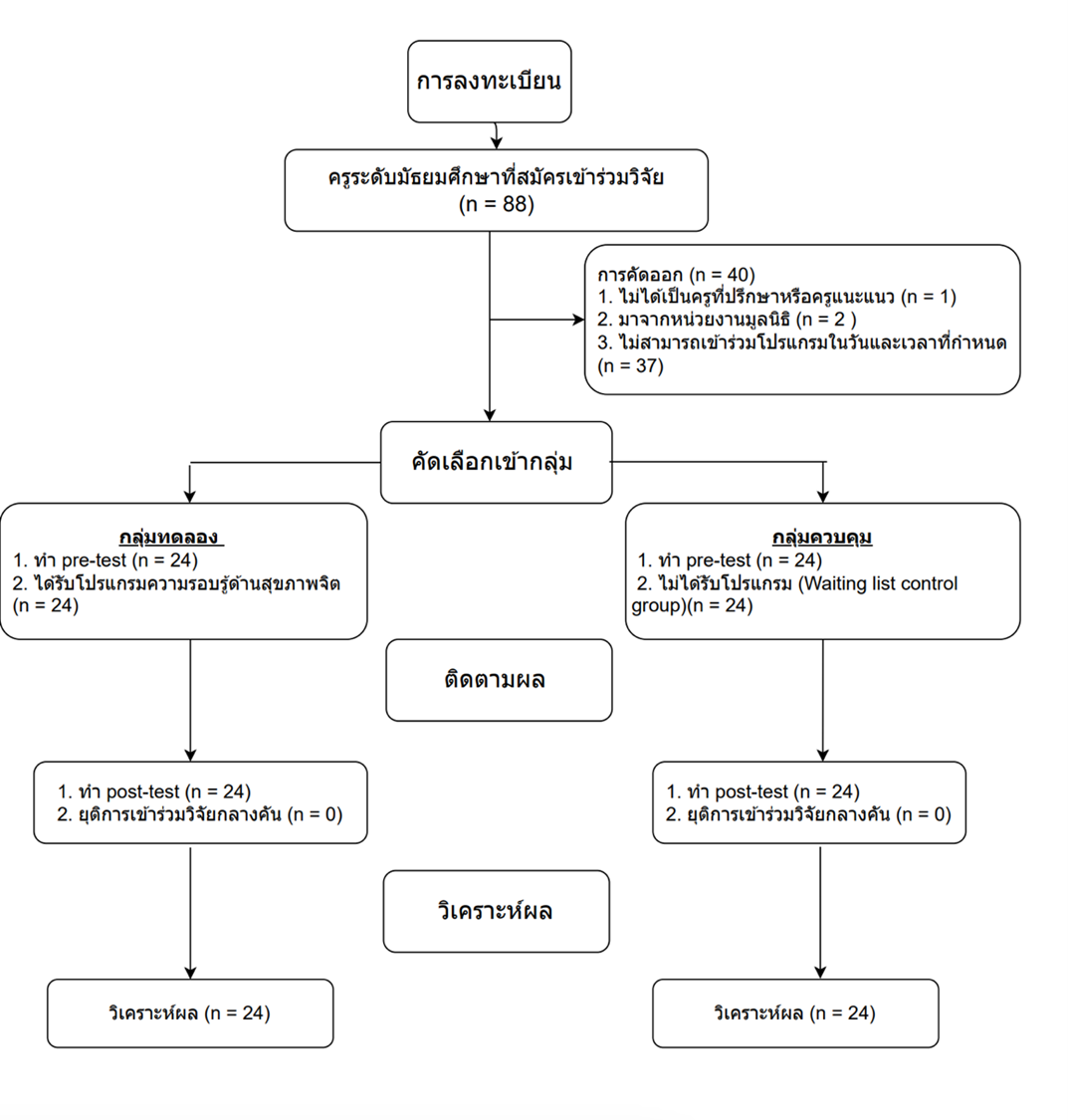The Effects of Mental Health Literacy Programme (The CARE) for Secondary School Teachers
DOI:
https://doi.org/10.14456/educu.2024.41Keywords:
mental health literacy in teachers, perceived self-efficacy in mental health, mental health in secondary school students, mental health problems in adolescents, mental health in schoolAbstract
Teachers play a crucial role in providing primary mental health support to students. However, previous studies showed that teachers’ mental health literacy is still limited. Thus, the aim of this study was to examine the effects of mental health literacy programme (The CARE) for secondary school teachers. This study used a quasi-experimental research design (pretest-posttest with control group). The research involved 48 class teachers and guidance teachers from secondary schools in Chiang Mai province, selected through simple randomized sampling. The sample was divided into experimental and control groups, each consisting of 24 participants using simple random sampling. The research instruments comprised 1) a demographic questionnaire 2) a mental health literacy test for teachers, and 3) a questionnaire on perceived self-efficacy regarding mental health for teacher. Data were analysed using mean, standard deviation, chi-square (χ2), t-test, and repeated measures MANOVA. The results demonstrated that after participating in the programme, the experimental group had significantly higher mental health literacy scores (M = 15.83, SD = 1.60) and perceived self-efficacy score (M = 64.04, SD = 4.61) than the baseline at the .016 level of significance. Additionally, analysis of the interaction between the experimental and control groups and measurement time revealed a significant effect on both mental health literacy scores (F(1, 46)= 24.69, p = .000, η2 = .349) and perceived self-efficacy scores (F (1, 46) = 76.77, p = .000, η2 = .625). In conclusion, The CARE programme significantly enhances mental health literacy and strengthens perceived self-efficacy among secondary school teachers, equipping them to provide effective initial support to students with mental health needs in schools.
References
ภาษาไทย
นันทกา สุปรียาพร (2566). สุขภาพจิตโรงเรียน:แนวทางการส่งเสริมสุขภาพจิตวัยรุ่น. วารสารครุศาสตร์ จุฬาลงกรณ์มหาวิทยาลัย, 51(1). https://doi.org/10.14456/educu.2023.2
พิชิต ฤทธิ์จรูญ. (2556). หลักการวัดและประเมินผลการศึกษา (พิมพ์ครั้งที่ 8). กรุงเทพมหานคร: บริษัท เฮ้าส์ ออฟ เคอร์มิสท์ จำกัด.
วิมลวรรณ ปัญญาว่อง, รัตนศักดิ์สันติธาดากุล, และ ชษิตา ภาวสุทธิไพศิฐ. (2563). ความชุกของภาวะซึมเศร้าและความเสี่ยงฆ่าตัวตายในวัยรุ่นไทย: การสำรวจโรงเรียนใน 13 เขตสุขภาพ. Journal of Mental Health of Thailand, 28(2), หน้า 136-149.
สำนักงานคณะกรรมการศึกษาขั้นพื้นฐาน. (2559). การพัฒนาระบบดูแลช่วยเหลือนักเรียน. สำนักงานคณะกรรมการการศึกษาขั้นพื้นฐาน กระทรวงศึกษาธิการ.
องค์การยูนิเซฟ ประเทศไทย. (2565). การเสริมสร้างความเข้มแข็งให้ระบบและบริการสนับสนุนทางจิตใจและจิตสังคมสำหรับเด็กและวัยรุ่นในเอเชียตะวันออกและแปซิฟิก: รายงานฉบับประเทศไทย. สถาบันวิจัยประชากรและสังคม มหาวิทยาลัยมหิดล. https://www.unicef.org/thailand/media/8876/file/MHPSS%20Report%202022.pdf.
ภาษาอังกฤษ
Bowen, D. J., Kreuter, M., Spring, B., Cofta-Woerpel, L., Linnan, L., Weiner, D., … Fernandez, M. (2009). How We Design Feasibility Studies. American Journal of Preventive Medicine, 36(5), 452–457. https://doi.org/10.1016/j.amepre.2009.02.002
Fuseekul, N., Orchard, F., & Reynolds, S. (2021). Depression among adolescents in Thailand: Cross-cultural assessment of depression and development of a mental health education programme for Thai teachers. [Doctoral dissertation, University of Reading]. CentAUR: Central Archive University of Reading. https://doi.org/10.48683/1926.00109385University of Reading.
Gimba, S. M., Harris, P., Saito, A., Udah, H., Martin, A., & Wheeler, A. J. (2020). The modules of mental health programs implemented in schools in low- and middle-income countries: findings from a systematic literature review. BMC Public Health, 20(1). https://doi.org/10.1186/s12889-020-09713-2
Jorm, A. F. (2012). Mental health literacy: Empowering the community to take action for better mental health. American Psychologist, 67(3), 231–243. https://doi.org/10.1037/a0025957
Kongsuk, T., Supanya, S., Kenbubpha, K., Phimtra, S., Sukhawaha, S., & Leejongpermpoon, J. (2017). Services for depression and suicide in Thailand. WHO South-East Asia Journal of Public Health, 6(1), 34–48. https://doi.org/10.4103/2224-3151.206162
Maggu, G., Verma, V., Chaudhury, S., & Indla, V. (2023). Epidemic of Depression and Anxiety in child and adolescent population during COVID-19 pandemic: A systematic review and meta analysis of the prevalence of depression and anxiety. Indian J Psychiatry, 65(3), 299–309.
Muenchhausen, S. V., Braeunig, M., Pfeifer, R., Göritz, A. S., Bauer, J., Lahmann, C., & Wuensch, A. (2021). Teacher Self-Efficacy and Mental Health—Their Intricate Relation to Professional Resources and Attitudes in an Established Manual-Based Psychological Group Program. Frontiers in Psychiatry, 12(510183). https://doi.org/10.3389/fpsyt.2021.510183
Nguyen, A. J., Dang, H.-M., Bul, D., Phoeun, B., & Welss, B. (2020). Experimental Evaluation of a School-Based Mental Health Literacy Program in two Southeast Asian Nations. School Mental Health, 12(4), 716–731. https://doi.org/10.1007/s12310-020-09379-6
Nishio, A., Kakimoto, M., Bermardo, T. M. S., & Kobayashi, J. (2020). Current situation and comparison of school mental health in ASEAN countries. Pediatrics International, 62(4), 438–443. https://doi.org/10.1111/ped.14137
Radez, J., Reardon, T., Creswell, C., Lawrence J., P., Evdoka-Burron, G., & Waite, P. (2020). Why do children and adolescents (not) seek and access professional help for their mental health problems? A systematic review of quantitative and qualitative studies. European Child and Adolescent Psychiatry, 30(2), 183–211. https://doi.org/10.1007/s00787-019-01469-4
Reis, A.C., Saheb, R., Moyo, T. Smith, C., & Sperandei, S. (2021). The Impact of Mental Health Literacy Training Programs on the Mental Health Literacy of University Students: a Systematic Review. Prev Sci, 23, 648–662. https://doi.org/10.1007/s11121-021-01283-y
Tay, K. W., Ong, A. W. H., Pheh, K. S., Low, S. K., Tan, C. S., & Low, P. K. (2019). Assessing the Effectiveness of a Mental Health Literacy Programme for Refugee Teachers in Malaysia. The Malaysian Journal of Medical Sciences, 26(6), 120–126. https://doi.org/0.21315/mjms2019.26.6.12
World Health Organization. (2017). Depression and Other Common Mental Disorders Global Health Estimates. https://apps.who.int/iris/bitstream/handle/10665/254610/WHO-MSD-MER-2017.2-eng.pdf?sequence=1
Xiao, Q., Song, X., Huang, L., Hou, D., & Huang, X. (2022). Global prevalence and characteristics of non-suicidal self-injury between 2010 and 2021 among a non-clinical sample of adolescents: A meta-analysis. Frontiers in Psychiatry, 13. https://doi.org/10.3389/fpsyt.2022.912441
Yamaguchi, S., Foo, J. C., Nishida, A., Ogawa, S., Togo, F., & Sasaki, T. (2018a). Mental health literacy programs for school teachers: A systematic review and narrative synthesis. Early Intervention in Psychiatry, 14(1). https://doi.org/10.1111/eip.12793

Downloads
Published
How to Cite
Issue
Section
License

This work is licensed under a Creative Commons Attribution-NonCommercial-NoDerivatives 4.0 International License.



